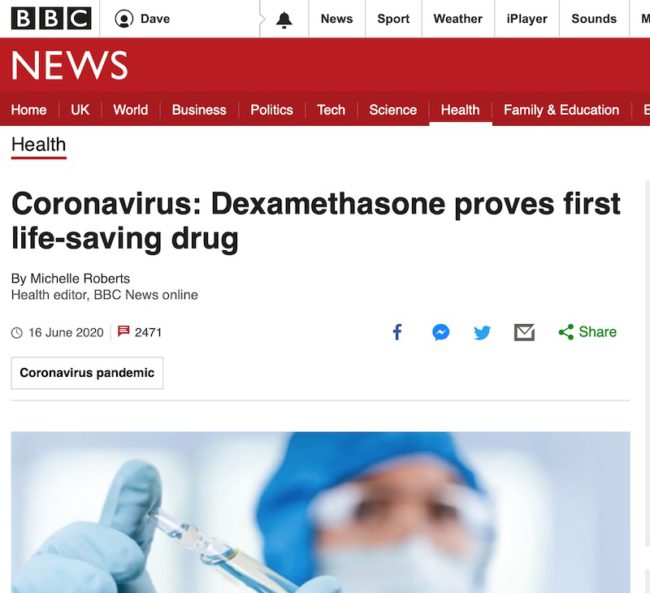
A great deal of cheer has arisen with the news that we now have a COVID-19 treatment – Dexamethasone. For example, the BBC is running the above story, as are many others …
A cheap and widely available drug can help save the lives of patients seriously ill with coronavirus.
The low-dose steroid treatment dexamethasone is a major breakthrough in the fight against the deadly virus, UK experts say.
The drug is part of the world’s biggest trial testing existing treatments to see if they also work for coronavirus.
It cut the risk of death by a third for patients on ventilators. For those on oxygen, it cut deaths by a fifth.
Had the drug had been used to treat patients in the UK from the start of the pandemic, up to 5,000 lives could have been saved, researchers say.
Is there a problem here?
On the surface it sounds fantastic. For the details, all we need to do is to get the published study … except there is nothing, no peer-reviewed articles, no data, not even an early draft of anything, nothing at all.
What we do have is just one isolated claim, a press release.
Yes, it is a credible source, the University of Oxford.
What is very concerning is that this is the promotion of scientific claims via press release without any data to verify it, and without any independent scrutiny.
Science News gets it right
A low-cost steroid may save the lives of some people who are on ventilators or supplemental oxygen because of COVID-19, preliminary data from a large clinical trial suggest.
Dexamethasone, a steroid in use for decades, reduced deaths of COVID-19 patients on ventilators by about a third compared with standard care, researchers reported in a news release June 16. Deaths of COVID-19 patients on supplemental oxygen were reduced by about 20 percent. Researchers found no benefit for hospitalized patients who didn’t need extra oxygen.
If the results hold up to scrutiny once scientists have a chance to review the full data, the drug would be the first to reduce the risk of death from the disease. For many patients who wind up in the hospital with COVID-19, “question one is, ‘Will I survive?’ and question two is ‘How long will I have to stay in hospital?’ This is the first drug that says, yes, we can increase your chances of survival,” says Martin Landray, a cardiologist at the University of Oxford.
Their use of “may” and “if” is wholly appropriate.
They do also drive the point home like this …
…“It’s not a fix. It’s not a cure. It’s not a miracle, but it is really, really useful,” …
…Rajesh Gandhi, an infectious diseases doctor at Massachusetts General Hospital and Harvard Medical School in Boston… “Right now we have very limited information, but if it’s borne out it could be really exciting.”…
All we have is a press release.
Granted it is from a credible source and so we need not doubt the sincerity of those making the claim. What is also true is that even the smartest of the smart can fool themselves, hence the importance of independent scrutiny and access to the actual study methodology and data.
They really should have had a manuscript ready to go with the press release, even if it was done via a preprint server.
What is scary is this is now happening …
Is it Credible?
Actually, yes it is.
It appears to only benefit very sick patients and this should not be a surprise.
It is a steroid. Steroids are immunosuppressants.
If you started taking this to help prevent COVID-19 then you would be an idiot. It would very likely increase your susceptibility to infection and COVID-19, rather than protect against infection.
If you have Acute respiratory distress syndrome and are on a ventilator and also have pneumonia, then yes, it is time to deploy steroids. This however is not new. ICU specialists have been doing that since the 1980s.
As for this latest hype, and make no mistake, it is hype and not data, the fundamental concern is this …
Meanwhile Boris jumps on the bandwagon and spins it all up
The UK government has 200,000 courses of the drug in its stockpile and says the NHS will make dexamethasone available to patients.
Prime Minister Boris Johnson said there was a genuine case to celebrate “a remarkable British scientific achievement”, adding: “We have taken steps to ensure we have enough supplies, even in the event of a second peak.”
